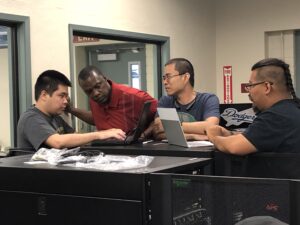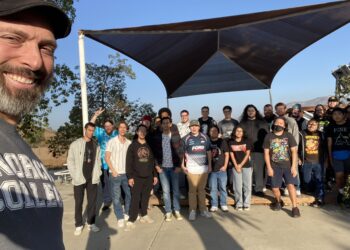Hackers Aweigh: Navy Internship Goes Beyond Basic Training for IT Students

When malware brought the entire city of Atlanta to its knees for over five days in 2018, it revealed a glimpse of the economic chaos that a lack of a trained cybersecurity workforce could affect.
But when a remote hacker tried to poison a Florida town’s water supply this past February, the stakes grew larger. With human lives on the line, the IT skills gap was no longer just a costly inconvenience but a national crisis.
“This is the world we live in,” says Chaffey College’s Computer Information Systems Professor David Nimri, committed to fortifying the ranks of future cyber heroes. In California alone, there is a shortage of 73,000+ skilled cybersecurity workers, according to the Silicon Valley Insider, leaving information from sensitive sectors like banking to the military vulnerable to cybercriminals.
Thus, Nimri was proud when Chaffey College became the first community college in the region to both offer an associate degree in cybersecurity and be designated as an Amazon Web Services academy site.
Practical training, says the industry expert, is crucial when it comes to fighting cybercrime.
“It is not the type of career where you just listen to something, know the facts, and then get a job,” says Nimri. “You have to be engaging with the material.”
That’s why, in addition to hundreds of hands-on labs in IT classes, employer’s eagerness to partner with the college to provide numerous internship and job opportunities is growing rapidly. Students have gleaned critical work experience with institutions like the Pomona Unified School District, TRL Systems, Analytik Jena AG and more. This year, a new partnership with San Bernardino County’s Health Information Technology Department set in motion yet another opportunity to engage hands-on with the scorching industry.

And now, with a game-changing new partnership in place, Chaffey is connecting students to select summer internships with NAVSEA, a research component of the U.S. Navy.
“Having the Naval center on their resumes is huge,” says Dena Mangini, Interim Director of the Career Center and Job Developer at the College. The program will match students with seasoned mentors, who will collaborate on projects to build real-world experience. Upon completion, learners will have a leg up for subsequent internship applications, increasing their chances of acceptance along with their compensation.
And that’s just the beginning, according to Mangini: “A lot of times, students end up getting jobs from the Naval center.”
The Corona center, located conveniently close to the campus, will allow Chaffey College students to build exclusive experience assisting in research and security tasks.
“It’s phenomenal for their careers,” says Nimri. “[The staff] really go out of their way to help our students.”
NAVSEA Warfare Centers fuel about 30 percent of the Navy’s overall engineering and science expertise while providing research, development and evaluation for the Navy’s fleet and systems. This summer, five Chaffey College students were accepted to paid internships – two from the Cybersecurity program and three from Chemical Engineering. Notably, four of the five interns are women.
“I’ve partnered with Professor David Nimri, and the demographics in his class alone are very diverse,” says Mangini. “Women are getting jobs and internships, and it’s amazing. He’s paving the way for other schools and programs.”
The experiences are made possible through a STEM Title 5 grant. Because the internship must be paid to circumvent liability issues, the funding has been crucial to initiate the opportunity, especially in the face of COVID challenges.
“Most of the credit goes to Dena’s perseverance,” remarks a grateful Nimri. “She really went to bat to try and set this up.”
For Mangini, going the extra mile has been well worth it. She worked with students on resumes and mock interviews, thoroughly vetting applicants to make sure cadets were committed to the internship. Meanwhile, she’s also taken the lead on collaborating with NAVSEA.
“They are very pleased and excited to partner with us,” says Mangini. “They have visited our campus, seen our students, and know what they are capable of doing.”
In a global economy with 3.5 million unfilled cybersecurity jobs across the world, according to Cybersecurity Ventures, it’s no wonder that industry partners are excited to prime the talent pipeline. Professionals earn $112,130 on average in California, with the field expanding at a blistering 33-percent rate, according to the Bureau of Labor Statistics.
“Once you get the specific skills and knowledge, it becomes incredibly easier for you to get a job,” says Nimri. When students can translate classroom skills to live internships, he believes, “it builds their confidence, skill sets and their ability to learn how to learn.”
While it’s true that businesses desperately need employees with the right cybersecurity skills, Nimri says they are cautious about “handing over the keys to the kingdom.” After all, it only takes one unscrupulous person to crash an entire network in mere seconds. That’s why being chosen for the Navy internship speaks to more than just a student’s ability… it’s also a reference for their integrity.
“Having those real-life skills applied at a respectable institution like the U.S. Navy can catapult somebody’s career,” the professor assures.
Due to the pandemic, this year’s internships are being performed remotely. But future cohorts may reap yet another benefit: receiving security clearance to work at the center. Increasingly, employers in government IT roles consider security-cleared workers to be top candidates, according to Entrust Solutions. As Mangini says, “If they get that security clearance, then that opens up doors.”
Nimri couldn’t be prouder of his hard-working learners, as they engage hands-on with the skills and training they need to be competitive. He says, “I want every single one of my students to have the confidence, abilities, knowledge and skills to get the job.”
For Nimri’s students, it’s a crash course in what to expect at the next level.
“Most, if not all, of the homework is simulations of real-world scenarios,” says Cheyenne Ward, slated to graduate this year from the Chaffey College Cybersecurity program. “[The] program provides the most relevant knowledge and hands-on experience needed to get a job in the industry.”

Ward will be transferring to California State University, San Bernardino for Computer Engineering. But before she casts off, she will be one of the lucky interns at the Naval center this summer.
She’s thrilled that this relevant experience will help her to stand apart from other job applicants and hopes to use the opportunity to explore software and security engineering career paths. One day, she dreams of working for Google, and landing this competitive internship will put her on the right track.
Says Ward, “The Cyber Security program at Chaffey College has given me the opportunity to showcase my skills in a professional setting, which I would not have gotten otherwise.”
Sources:
CA GOV CYBERSECURITY TASK FORCE – SHORTAGE OF 73,000+ CYBERSECURITY PROS, https://www.svin.biz/cybersecurity
Cybersecurity Talent Crunch To Create 3.5 Million Unfilled Jobs Globally By 2021 https://cybersecurityventures.com/jobs/
Information Security Analysts, https://www.onetonline.org/link/localwages/15-1212.00?st=CA&g=Go
3 Benefits of Having a Security Clearance in the IT Industry https://www.entrustsolutions.com/2019/08/09/benefits-of-having-a-security-clearance-it-industry/





